| Srl | Item |
| 1 |
ID:
131191
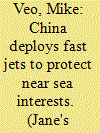

|
|
|
|
|
| Publication |
2014.
|
| Summary/Abstract |
Recent events in the South China and East China seas suggest an increase in the confidence and capabilities of the china's People's Liberation Army Air Force (PLAAF) and People's Liberation Army Navy Air Force (PLANAF).
|
|
|
|
|
|
|
|
|
|
|
|
|
|
|
|
| 2 |
ID:
112649
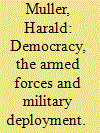

|
|
|
|
|
| Publication |
Frankfurt, Peace Research Institute Frankfurt (PRIF), 2011.
|
| Description |
ii, 28p.Pbk
|
| Series |
PRIF reports no.108
|
| Standard Number |
9783942532310
|
|
|
|
|
|
|
|
|
|
|
|
Copies: C:1/I:0,R:0,Q:0
Circulation
| Accession# | Call# | Current Location | Status | Policy | Location |
| 056421 | 355.4/MUL 056421 | Main | On Shelf | General | |
|
|
|
|
| 3 |
ID:
107326
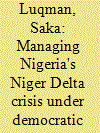

|
|
|
|
|
| Publication |
2011.
|
| Summary/Abstract |
Since the return to civil rule, the Niger Delta has witnessed increasing dissent in the form of an armed insurgency with the attendant criminal activities. The Nigerian state has sought to manage the region's crisis using both conciliatory and militarist approaches with little success. Drawing insights from in-depth interviews, newspaper interviews, commentaries and editorials, this article assesses the utility of military deployment in containing the crisis. While recognising the need for securing oil installations, the scale of avoidable civilian casualties raises questions about the utility of military engagement in managing the Niger Delta crisis.
|
|
|
|
|
|
|
|
|
|
|
|
|
|
|
|
| 4 |
ID:
128650
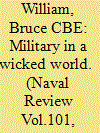

|
|
|
|
|
| Publication |
2013.
|
| Summary/Abstract |
All too frequently military interlocutors outside the European Union - EU get frustrated that we don't act or feel like NATO. What follows attempt to address that frustration and suggest that the unique complexities of the EU are both desirable and increasingly proving to be an advantage in some circumstance. The other highlights how the EU integrates military effects into its external action and shows why the EU does not duplicate NATO, why it has a different philosophy of working ; why (at times) it has entirely different roles; and why such difference may eventually be seen as more complementary, and not in competition, with the efforts of other defence dominated organisations such as NATO.
|
|
|
|
|
|
|
|
|
|
|
|
|
|
|
|
| 5 |
ID:
129959
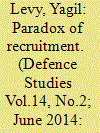

|
|
|
|
|
| Publication |
2014.
|
| Summary/Abstract |
This article compares six cases between the US and Israel in the areas of anti-war mobilization and its impact on military deployment, force protection, and prisoners' swap. It argues that the more the recruitment is built on state-coercion rather than market regulation, the higher the state's sensitivity to the well-being of its soldiers because the likelihood for collective action focused on military issues is higher. The power of republican discourse, the coercion of recruitment on powerful, but sometimes also unwilling enlistees, and the favoring of voice over exit all cause the state to increase its commitment to its soldiers. At the extreme, the state may even favor soldiers' lives more than its commitment to protect the citizens.
|
|
|
|
|
|
|
|
|
|
|
|
|
|
|
|
| 6 |
ID:
131726
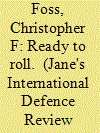

|
|
|
|
|
| Publication |
2014.
|
| Summary/Abstract |
By the end of 2014 combat operations by foreign forces in Afghanistan will have ceased and the deployed armoured fighting vehicle (AFVs) and other equipment will be on their way home.
|
|
|
|
|
|
|
|
|
|
|
|
|
|
|
|
| 7 |
ID:
122611
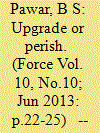

|
|
|
| 8 |
ID:
131720
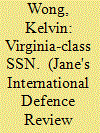

|
|
|
|
|
| Publication |
2014.
|
| Summary/Abstract |
USS North Carolina (SSN 777), the US navy's (USN's) fourth Virginia class nuclear attack submarine (SSN), docked at Singapore's Changi Naval base for crew rest and resupply in late April 2014 after four months at sea. While on its second western pacific deployments it conducted a range of mission including an anti-submarine warfare (ASW) training exercise with the latest P-8A Poseidon.
|
|
|
|
|
|
|
|
|
|
|
|
|
|
|
|
| 9 |
ID:
158445


|
|
|
|
|
| Summary/Abstract |
This paper investigates what motivates young people to volunteer for peace-keeping or peace-enforcing missions and how their motives change between pre- and post-deployment. Data include information about social and military background, and motives for more than 600 soldiers, 444 of whom answered the survey both before and after deployment. Soldiers are deployed to different missions under the same circumstances. To conceptualize motives among soldiers, we use factor analysis and find three factors: challenge, self-benefit, and fidelity. Challenge represents an occupational orientation; fidelity, an institutional orientation; and self-benefit, a desire for adventure. Exploiting the within-subject design of our data, we find that pre- and post-deployment motives vary significantly according to the type of mission and soldiers’ previous experiences (first-timers or experienced soldiers). Our results suggest that after the mission, peace-keepers are generally more disappointed than peace-enforcers. Our results also show that self-benefit motives are important for younger soldiers with only a high school education, and that this group usually serves as peace-enforcers during their gap year.
|
|
|
|
|
|
|
|
|
|
|
|
|
|
|
|